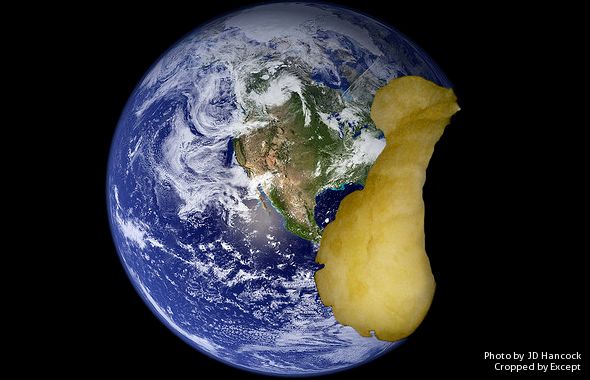Humans have exhausted a year’s supply of natural resources in less than eight months, a big toxic water release in the USA, and now is your chance to buy a Spanish village. Read all about it in this Wormfood.
Global News: Earth Overshoot Day
-
Earth overshoot day – the day each year when our demands on the planet outstrip its ability to regenerate – came six days earlier than 2014 on August 13, with world’s population currently consuming the equivalent of 1.6 planets a year.
-
Explore live statistics on everything from child labor and slavery to toxic waste and climate change.
-
A very large number of scientific and technological luminaries have signed an open letter calling for the world's governments to ban the development of "offensive autonomous weapons" to prevent a "military AI arms race." The letter is signed by Stephen Hawking, Elon Musk, Noam Chomsky, the Woz, and dozens of other AI and robotics researchers.
-
Greenland's glaciers flowing into the ocean are grounded deeper below sea level than previously measured, allowing intruding ocean water to badly undercut the glacier faces. That process will raise sea levels around the world much faster than currently estimated, according to a team of researchers led by Eric Rignot of the University of California, Irvine (UCI), and NASA's Jet Propulsion Laboratory, Pasadena, California.
Energy & Environment: Scotland says No to GMO

-
Scottish ministers are planning to formally ban genetically modified crops from being grown in Scotland, widening a policy divide with the Conservative government in London. Richard Lochhead, Scotland’s environment secretary, said he wanted to uphold the precautionary principle – that the potential risks to other crops and wildlife from GMOs outweighed the likely benefits of the technology – by banning the commercialization of GM crops.
-
Farmers will be able to use blacklisted pesticides linked to serious harm in bees after the UK government temporarily lifted an EU ban. Opponents called the decision “scandalous” and criticized the government’s secrecy, which The Guardian revealed has included gagging its own expert advisers.
-
An estimated 1m gallons of toxic mine water was accidentally released by the Environmental Protection Agency (EPA) in the Colorado river. The EPA’s initial tests of the waste water and sediment found substances known to be harmful to be human health, including lead, arsenic, cadmium, copper, calcium and other heavy metals “at varying levels,” though at concentrations enough for officials to warn people away from the river.
Business & Economy: Spanish Villages for Sale

-
Around 400 villages are up for sale in Spain's northern Galicia, some of which are being offered for free. This northwestern region of the country is plagued with a shrinking population, resulting in some mayors selling the villages for free to anyone who can repopulate it by bringing people back, more importantly, the youth.
-
Leaked documents show the UK is pushing for watered-down EU air pollution laws to be weakened further, arguing they would cause pit closures leading to substantial job losses and the need to import coal.
-
Futurists predict jobs of the future, such as professional tribers, freelance professors, urban farmers, and end-of-life planners.
-
Private investors stand to lose $4.2tn (£2.7tn) on the value of their holdings from the impact of climate change by 2100 even if global warming is held at plus 2C, a report from the Economist Intelligence Unit (EIU) has warned.
Science, Technology & Design: Design Hippocratic Oath

-
A group of designers have banded together to craft their own version of an ethical code, like medical practitioners’, with the widespread principle to “first, do no harm“. Designers can be co-creators of life-enhancing projects—but they are also often accomplices in creating evil inventions and products with pernicious consequences.
-
Google is mapping the planet’s solar energy potential, one rooftop at a time. Their tool uses high-resolution aerial mapping (the same used by Google Earth) to help calculate solar energy potential for rooftops.
-
Dogs capable of sniffing out cancer have been approved for use in a trial by the National Health Service. The charity Medical Detection Dogs has gained approval from Milton Keynes University Hospital for further trials, after an initial study showed specially trained dogs can detect prostate tumors in urine in 93% of cases.
-
Scientists in Canada are developing an industrial carbon dioxide recycling plant that could one day suck CO2 out of the atmosphere and convert it into fuel. Developed by tech start-up Carbon Engineering and partly funded by Bill Gates, the system will essentially do the job of trees, but in places unable to host them, such as icy plains and deserts.
Urban Environment: Treeconomics

-
Introducing 'treeconomics': how street trees can save our cities.
-
In Toronto, researchers recently found that people living on tree-lined streets reported health benefits equivalent to being seven years younger or receiving a $10,000 salary rise.
-
As well as studies revealing benefits from everything from improved mental health to reduced asthma, US scientists have even identified a correlation between an increase in tree-canopy cover and fewer low-weight births.
-
And economic studies show what any estate agent swears by: leafy streets sell houses. Street trees in Portland, Oregon, yielded an increase in house prices of $1.35bn, potentially increasing annual property tax revenues by $15.3m.
-
-
Galdakao is home to Spain’s first “solidarity fridge”, in which residents and restaurants can drop off leftover or unused food otherwise destined for the bin. Anything left in the fridge can be picked up by anyone who wants it.
-
Homeless people in Atlanta are planting an organic garden to provide food for shelter residents. The gardeners benefit from eating healthy fruits and vegetables, and also obtain job skills that will serve them in the future.
-
Water-cooled data centers use an estimated 13.25m liters (3.5m gallons) per MW each year, according to Jack Pouchet, a board member with The Green Grid, a non-profit that promotes resource efficiency in information technology. Water keeps our internet-based economy afloat by ensuring equipment in data centers stays cool enough to function.
Unexpected and Intriguing: Internet "deliveries" by hand.

-
Cuban internet is delivered weekly by hand.
-
British Library asks for help deciphering a medieval sword.
-
China's top anti-pornography office is launching a campaign to purify the web and strip it of amateur sex clips.
-
Disney apologizes for 'congratulations' tweet on Nagasaki anniversary.
If you come across news items suited for the Wormfood, or a theme you would like to see a newsletter being dedicated to, please let me know and we'll do our best to make some magic happen.
Sept. 22, 2015

